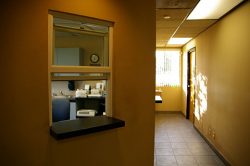What is a Methadone Dispensary?
A methadone dispensary is a facility where opioid addicts can receive methadone maintenance treatment in order to help them recover from addiction and stop abusing dangerous opioid drugs. These facilities are also called methadone clinics or methadone treatment centers, and they have been providing one of the most beneficial treatment options for opioid addicts since the 1960s.
What Do Methadone Dispensaries Do?

Methadone dispensaries provide treatment for opiate addiction.
These facilities provide opioid addicts with professional, medical treatment for their withdrawal symptoms, cravings, and many other issues associated with their addictions. Patients must visit the dispensary in order to receive their daily dose of methadone because the drug cannot be prescribed at a doctor’s office or picked up from a pharmacy. This is due to the fact that many individuals attempt to abuse methadone, making the treatment itself “one of the most monitored and regulated medical treatments in the country,” as stated by the National Institute of Justice.
What Treatment Options are Available at Methadone Dispensaries?
Methadone maintenance is not the only treatment option available at these facilities. A full methadone maintenance program often utilizes behavioral therapy in addition to other methods, depending on the individual’s needs. Some of the other services these facilities often provide include:
- Group therapy
- Individual therapy or drug counseling
- Medical services
- HIV prevention
- Drug education
- Housing help
- Vocational counseling and resume building
This type of facility may provide a number of other treatment options, but it depends on the individual clinic when it comes to which options are available. However, referrals to agencies or other clinics that assist with mental and physical health issues are often available if the clinic itself does not provide a certain treatment type that is required by the patient.
Do Methadone Dispensaries Work?
Because this treatment option requires patients and clinicians to understand that some individuals will not be able to stop abusing opioids and that they are instead better served by maintenance treatment, methadone has been politically controversial for many years. It has also, though, been used to treat hundreds of thousands of individuals who, according to the Center for Substance Abuse Research, have shown to experience reduced instances of “narcotics related deaths… involvement in crime, [and] the spread of AIDS.” Methadone has also been known to:
- Reduce the spread of other transmittable diseases and infections including hepatitis, bacterial infections, thrombophlebitis, and more
- Increase positive pregnancy outcomes
- Increase family stability and life satisfaction
- Increase employment in recovering addicts
Methadone dispensaries can be incredibly beneficial to many addicts, whether they decide to eventually detox slowly from the medication or stay on it indefinitely. Though the treatment has been considered somewhat controversial for many years, it has eventually become one of the most widely accepted treatments for opioid addiction and remains one of the most established options when it comes to treating opioid addicts.
Do You Want to Find a Methadone Dispensary in Your Area?
Call 800-994-1867Who Answers? today, and we will help you find a local methadone dispensary where you can begin your addiction treatment. Make a change in your life, and start on your road to recovery.